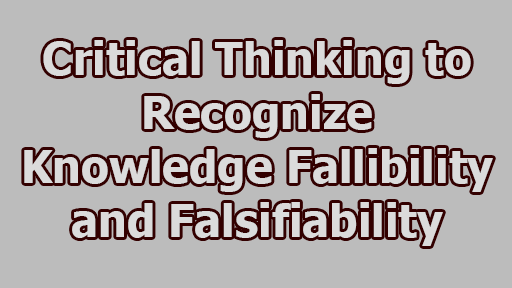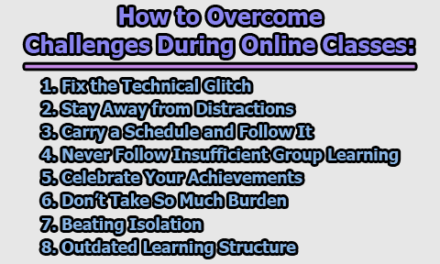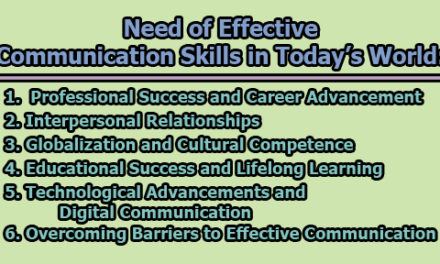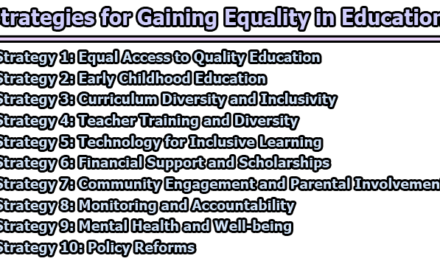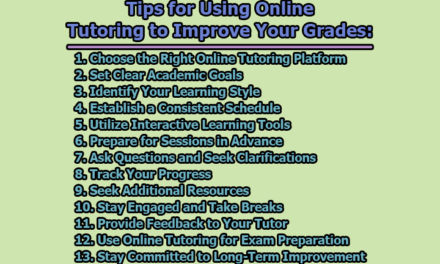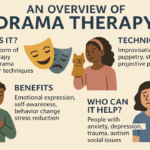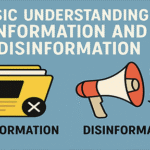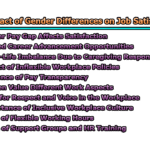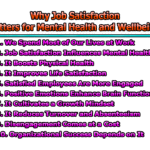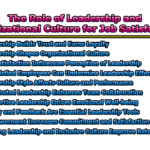Critical Thinking to Recognize Knowledge Fallibility and Falsifiability:
In an age dominated by information, where facts and opinions often blur into one another, the ability to think critically has never been more vital. Critical thinking is the bedrock of rational inquiry, enabling individuals to evaluate and question the knowledge presented to them. It is an essential skill not only for scholars and scientists but for every individual navigating the complex landscape of the modern world. In this era of rapid technological advancement and unprecedented access to information, recognizing the fallibility and falsifiability of knowledge is paramount. In the rest of this article, we will explore critical thinking to recognize knowledge fallibility and falsifiability; foundations of critical thinking, examine the concept of knowledge fallibility, and dissect the importance of falsifiability in different domains. Along the way, we will equip you with tools and strategies to hone your critical thinking skills, empowering you to engage with information in a more discerning and insightful manner.
1. The Foundations of Critical Thinking:
Before we plunge into the heart of recognizing knowledge fallibility and falsifiability, it’s crucial to establish a solid understanding of the foundations of critical thinking.
1.1 Defining Critical Thinking: Critical thinking can be defined as “the intellectually disciplined process of actively and skillfully conceptualizing, applying, analyzing, synthesizing, and/or evaluating information gathered from, or generated by, observation, experience, reflection, reasoning, or communication, as a guide to belief and action” (Scriven & Paul, 1987, p. 2). In essence, it is a cognitive process that involves taking information, examining it closely, and making informed judgments based on evidence and sound reasoning.
1.2 The Elements of Critical Thinking: Critical thinking consists of several key elements that work in tandem to facilitate effective decision-making and problem-solving (Facione, 2011). These elements include:
- Analysis: Analysis is the process of breaking down complex information or arguments into their constituent parts. It involves identifying the key components, relationships, and patterns within the information. Analytical skills are crucial for understanding the structure of an argument or the intricacies of a problem.
- Evaluation: Evaluation is the ability to assess the strengths and weaknesses of arguments, claims, or evidence. Critical thinkers are skilled at recognizing logical fallacies, biases, and unsupported assertions in the information they encounter. They use evaluation to determine the credibility and reliability of sources.
- Interpretation: Interpretation involves making sense of information by considering its context and relevance. It goes beyond simply understanding the facts; it requires extracting meaning from data, texts, or experiences. Interpretive skills are essential for grasping the implications and significance of information.
- Inference: Inference is the process of drawing conclusions based on available evidence and reasoning. Critical thinkers are adept at making logical deductions and identifying implicit assumptions. They use inference to make informed judgments and predictions.
- Explanation: Explanation entails the ability to provide clear, concise, and coherent reasons for one’s beliefs or judgments. It involves articulating the thought process behind a particular conclusion. Effective explanation is essential for conveying one’s ideas to others and facilitating understanding.
- Problem Solving: Critical thinking is not limited to passive analysis; it also encompasses problem-solving. Problem-solving involves applying critical thinking skills to practical situations to reach well-reasoned solutions. Critical thinkers approach complex problems methodically and creatively.
1.3 The Role of Skepticism: Skepticism is a fundamental aspect of critical thinking (Ennis, 1982). It involves questioning assumptions, challenging prevailing beliefs, and demanding evidence to support claims. Skepticism does not entail outright rejection of information but rather a cautious and critical approach to accepting it. Critical thinkers are naturally curious and tend to scrutinize information, especially when it appears to be too good to be true or conflicts with established knowledge.
1.4 The Importance of Intellectual Humility: Intellectual humility is closely linked to critical thinking (Leary et al., 2017). It is the recognition that one’s knowledge and beliefs are fallible and subject to revision. Intellectual humility encourages individuals to admit when they are wrong and to be open to learning from others. It fosters a mindset that is receptive to new information and perspectives, making critical thinkers more adaptable and open-minded.
2. Knowledge Fallibility: Embracing the Imperfect Nature of Knowledge
Knowledge fallibility is a fundamental concept that lies at the heart of critical thinking. It refers to the inherent limitations and imperfections of human knowledge, emphasizing that what we know is never absolute or infallible but subject to revision and refinement. This section explores the multifaceted nature of knowledge fallibility and its significance in cultivating a critical mindset.
2.1 The Fallibility of Perception and Memory: Human perception and memory are notoriously fallible (Schacter, 1999). Our senses, while remarkable, can be easily deceived. Optical illusions, for instance, demonstrate how our visual perception can lead us to false conclusions. Additionally, memory is susceptible to distortion and forgetting. Details of past events can become blurred or altered over time, making personal recollections unreliable.
Critical thinkers recognize that the fallibility of perception and memory introduces a degree of uncertainty into our understanding of the world. They approach firsthand experiences and eyewitness accounts with caution, acknowledging that what individuals perceive and remember may not always align with objective reality.
2.2 Cognitive Biases and Heuristics: Cognitive biases and heuristics are cognitive shortcuts that our brains employ to process information efficiently (Tversky & Kahneman, 1974). While these mental shortcuts can be adaptive, they also introduce systematic errors in our thinking. Critical thinkers are acutely aware of common biases such as confirmation bias, availability heuristic, and anchoring bias.
- Confirmation Bias: Confirmation bias is the tendency to seek, interpret, and remember information that confirms our preexisting beliefs while disregarding contradictory evidence. Critical thinkers actively strive to mitigate confirmation bias by actively seeking out diverse perspectives and evidence.
- Availability Heuristic: The availability heuristic leads us to rely on readily available information, often from recent or vivid experiences, to make judgments. Critical thinkers recognize that this can lead to skewed judgments and make a conscious effort to consider a broader range of information sources.
- Anchoring Bias: Anchoring bias occurs when individuals rely too heavily on the first piece of information encountered (the “anchor”) when making decisions. Critical thinkers are cautious of being unduly influenced by initial information and work to assess all relevant data.
2.3 The Evolving Nature of Science: Science, despite its remarkable progress, is not immune to fallibility. Scientific knowledge is continually evolving as new evidence emerges and existing theories are revised or discarded (Popper, 1959). The history of science is replete with examples of once-accepted ideas that were later proven incorrect or incomplete.
Critical thinkers understand that scientific knowledge is provisional, subject to revision in light of new data. They appreciate that the scientific method itself is a self-correcting process designed to mitigate the impact of human fallibility. This recognition encourages a healthy skepticism and a willingness to accept that our current understanding of the natural world may be incomplete.
2.4 The Role of Uncertainty: Uncertainty is a fundamental aspect of knowledge fallibility, particularly in fields where absolute certainty is elusive (Knight, 1921). In disciplines such as economics, climate science, and medicine, decision-making often occurs in the presence of uncertainty. Critical thinkers are comfortable with uncertainty and have developed the skills to navigate it.
They understand that decisions made in uncertain environments must be based on probabilistic reasoning and a careful weighing of evidence. Instead of succumbing to uncertainty-induced paralysis, they embrace uncertainty as an inherent feature of complex problem-solving.
2.5 The Risks of Overconfidence: Overconfidence is the antithesis of intellectual humility and a key obstacle to critical thinking (Moore & Healy, 2008). Overconfident individuals exhibit an unwarranted belief in the absolute correctness of their knowledge and opinions. This can lead to dogmatism, closed-mindedness, and a refusal to consider alternative viewpoints.
Critical thinkers guard against overconfidence by recognizing the limitations of their knowledge. They are willing to acknowledge when they lack expertise in a particular area and seek out reliable sources of information. This humility in the face of uncertainty fosters a more open and receptive attitude toward learning and growth.
3. Falsifiability: The Acid Test of Knowledge
Falsifiability is a concept introduced by the philosopher Karl Popper and is central to the scientific method. It asserts that for a claim or theory to be considered scientific, it must be possible to conceive of evidence that could prove it false. Falsifiability acts as a powerful tool for distinguishing between scientific and non-scientific claims, playing a pivotal role in the pursuit of knowledge. In this section, we explore the concept of falsifiability, its origins, applications, and implications for critical thinking.
3.1 The Popperian Notion of Falsifiability: Karl Popper, in his seminal work “The Logic of Scientific Discovery” (1959), proposed the criterion of falsifiability as a demarcation criterion to distinguish scientific theories from non-scientific ones. According to Popper, a scientific hypothesis or theory must be framed in a way that allows for the possibility of empirical observations or experiments that could potentially disprove it. In other words, for a claim to be considered scientific, it must be falsifiable in principle.
This notion of falsifiability stands in stark contrast to unfalsifiable claims or pseudoscientific beliefs, which are often characterized by their resistance to empirical testing or the absence of any conceivable evidence that could refute them. By emphasizing falsifiability, Popper aimed to ensure that scientific theories were open to scrutiny and that the scientific method was inherently self-correcting.
3.2 Pseudoscience and Unfalsifiability: Pseudoscience refers to beliefs or practices that claim to be scientific but lack empirical evidence and fail the test of falsifiability (Shermer, 2002). These beliefs often persist in the absence of supporting evidence because they are framed in such a way that they cannot be empirically tested or disproven. Examples of pseudoscientific claims include astrology, homeopathy, and various paranormal phenomena.
Critical thinkers are cautious when encountering pseudoscientific claims. They recognize that the inability to subject a claim to empirical testing or falsification is a red flag. The absence of falsifiability raises questions about the credibility and scientific validity of such claims.
3.3 Falsifiability Beyond Science: While falsifiability is primarily associated with the scientific method, its principles can be applied beyond the realm of science. In everyday life, many claims and beliefs can benefit from being subjected to the idea of falsifiability. Critical thinkers apply this concept to areas such as politics, economics, and personal beliefs to ensure that they remain open to scrutiny and revision.
For example, in politics, a critical thinker might evaluate a policy proposal by considering whether there are clear criteria or evidence that could prove it ineffective or harmful. In economics, one might examine economic theories to see if they can be tested against real-world data and potentially refuted. Even in personal beliefs, individuals can apply falsifiability by asking themselves what evidence or events would lead them to reconsider their convictions.
3.4 The Falsifiability of Moral and Ethical Beliefs: Even moral and ethical beliefs can be examined through the lens of falsifiability (Hauser, 2006). While moral principles are deeply held and often subjective, critical thinkers recognize that they should still be open to debate and revision in the face of compelling evidence or reasoned arguments. Falsifiability in this context involves considering whether there are conceivable situations or arguments that could challenge or undermine one’s ethical stance.
For example, a critical thinker who holds a strong ethical belief against capital punishment might consider what evidence or moral arguments could potentially lead them to reconsider their position. This approach promotes ethical introspection and encourages individuals to engage in thoughtful moral reasoning rather than dogmatic adherence to fixed principles.
4. Developing Critical Thinking Skills:
Now that we have explored the foundations of critical thinking, the concept of knowledge fallibility, and the role of falsifiability, let’s turn our attention to practical strategies for developing and honing critical thinking skills.
4.1 Cultivate Curiosity: Curiosity is the engine that drives critical thinking. It involves a natural inclination to ask questions, seek answers, and explore new ideas and perspectives. Cultivating curiosity is the first step toward becoming a better critical thinker. Here’s how:
- Ask Questions: Encourage yourself to ask questions about the world around you. Whether you’re reading a news article, studying a textbook, or having a conversation, don’t hesitate to inquire further.
- Seek Out Diverse Information: Engage with a wide range of topics and viewpoints. Curiosity thrives when you expose yourself to different ideas and experiences.
- Stay Informed: Keep up with current events, scientific discoveries, and cultural developments. Being aware of what’s happening in the world can spark curiosity and prompt critical thinking.
4.2 Practice Active Listening: Effective critical thinking begins with active listening. This skill is essential for processing information, understanding different perspectives, and engaging in meaningful discussions. Here are some tips for improving your active listening skills:
- Give Your Full Attention: When someone is speaking, give them your undivided attention. Avoid distractions and focus on what they are saying.
- Ask Clarifying Questions: If you don’t fully understand something, don’t hesitate to ask for clarification. This not only enhances your understanding but also shows that you are engaged in the conversation.
- Avoid Jumping to Conclusions: Resist the urge to formulate your response while the other person is speaking. Instead, listen actively and consider their perspective before responding.
4.3 Diversify Your Sources: Critical thinkers are careful about where they obtain information. To avoid confirmation bias and gain a broader perspective, it’s crucial to diversify your sources of information. Here’s how:
- Seek Multiple Viewpoints: When researching a topic, consult sources with varying opinions and perspectives. This helps you develop a well-rounded understanding.
- Fact-Check Information: Verify the accuracy of information from multiple sources, especially if it seems dubious. Fact-checking is a critical thinking skill that prevents the spread of misinformation.
- Use Reliable References: When conducting research, rely on reputable and credible sources, such as peer-reviewed journals, established news outlets, and academic publications.
4.4 Question Everything: Critical thinkers are naturally curious and skeptical. They don’t take information at face value but instead question the validity and reliability of sources, claims, and arguments. Here’s how to develop this critical thinking habit:
- Challenge Assumptions: Examine your own assumptions and those of others. Ask whether they are based on evidence or merely accepted without question.
- Evaluate Evidence: Assess the quality and relevance of evidence presented in support of a claim. Determine whether the evidence is credible, recent, and unbiased.
- Spot Logical Fallacies: Familiarize yourself with common logical fallacies, such as ad hominem attacks, strawman arguments, and false dichotomies. Recognizing these fallacies will help you spot flawed reasoning.
4.5 Learn Logical Fallacies: Logical fallacies are errors in reasoning that can undermine critical thinking. Familiarizing yourself with these fallacies can help you identify flawed arguments and think more critically. Here are some common fallacies to be aware of:
- Ad Hominem: Attacking the person making an argument instead of addressing the argument itself.
- Strawman: Misrepresenting an opponent’s argument to make it easier to attack.
- False Dichotomy: Presenting a situation as if there are only two possible options when, in fact, there are more.
- Hasty Generalization: Drawing a broad conclusion based on insufficient or biased evidence.
- Circular Reasoning: Using the conclusion of an argument as one of its premises.
4.6 Cultivate Intellectual Humility: Intellectual humility is the recognition that one’s knowledge and beliefs are fallible. It’s a key aspect of critical thinking that keeps your mind open and receptive to new information. To cultivate intellectual humility:
- Admit When You’re Wrong: Don’t be afraid to acknowledge when you’ve made a mistake or when your beliefs have evolved. This is a sign of intellectual growth.
- Listen to Others: Actively seek out and listen to different perspectives, even if they challenge your existing beliefs.
- Be Open to Change: Be willing to revise your opinions and beliefs in the face of compelling evidence or reasoned arguments.
4.7 Seek Feedback: Feedback is a valuable tool for improving your critical thinking skills. Seek feedback from peers, mentors, or educators to identify areas where you can enhance your critical thinking abilities. Constructive criticism can provide valuable insights and help you overcome blind spots.
4.8 Engage in Deliberate Practice: Critical thinking is a skill that can be developed through deliberate practice. Engage in activities that challenge your thinking, such as:
- Solving Puzzles: Logical and analytical puzzles, such as Sudoku or crossword puzzles, can sharpen your problem-solving skills.
- Debating Ethical Dilemmas: Engaging in ethical debates and discussions can help you refine your ability to consider complex moral issues.
- Evaluating Research Papers: Practice critically evaluating research papers and scientific studies. Pay attention to methodology, evidence, and conclusions.
4.9 Foster a Growth Mindset: Adopt a growth mindset, which is the belief that intelligence and abilities can be developed through effort and learning (Dweck, 2006). A growth mindset encourages resilience in the face of challenges and setbacks, fostering a commitment to continuous improvement in critical thinking skills.
In conclusion, the principles of recognizing knowledge fallibility and falsifiability are essential cornerstones of critical thinking. Understanding that our knowledge is not infallible but rather subject to error and revision is a humbling realization. It encourages intellectual humility, reminding us that we should always be open to new information and perspectives, even when we feel confident in our beliefs.
Falsifiability, on the other hand, emphasizes the importance of subjecting our beliefs and hypotheses to rigorous testing. By establishing clear criteria that, if met, could disprove our assertions, we create a foundation for empirical scrutiny and the advancement of knowledge. This approach prevents us from becoming entrenched in dogma and encourages the growth of our understanding.
In today’s rapidly evolving world, where information flows freely and often changes, recognizing the fallibility of our knowledge and the importance of falsifiability is more critical than ever. It empowers us to question, adapt, and refine our understanding, ultimately leading to a more informed and adaptable society. By embracing these principles, we not only enhance our critical thinking skills but also contribute to the collective pursuit of truth and knowledge.
References:
- Facione, P. A. (2011). Critical thinking: What it is and why it counts (2011 Update). Measured Reasons and The California Academic Press.
- Dweck, C. S. (2006). Mindset: The New Psychology of Success. Ballantine Books.
- Ennis, R. H. (1982). Goals for a critical thinking curriculum. The American Philosophical Association, 1982.
- Hauser, M. (2006). Moral Minds: How Nature Designed Our Universal Sense of Right and Wrong. Harper Perennial.
- Knight, F. H. (1921). Risk, Uncertainty, and Profit. Houghton Mifflin Company.
- Leary, M. R., Diebels, K. J., Davisson, E. K., Jongman-Sereno, K. P., Isherwood, J. C., Raimi, K. T., … & Hoyle, R. H. (2017). Cognitive and interpersonal features of intellectual humility. Personality and Social Psychology Bulletin, 43(6), 793-813.
- Mascarenhas, O.A.J., Thakur, M. and Kumar, P. (2023), “Critical Thinking for Understanding Fallibility and Falsifiability of Our Knowledge”, A Primer on Critical Thinking and Business Ethics, Emerald Publishing Limited, Bingley, pp. 187-216. https://doi.org/10.1108/978-1-83753-308-420231007
- Moore, D. A., & Healy, P. J. (2008). The trouble with overconfidence. Psychological Review, 115(2), 502-517.
- Paul, R., & Elder, L. (2006). Critical thinking: The nature of critical and creative thought. Journal of Developmental Education, 30(2), 34-35.
- Popper, K. (1959). The Logic of Scientific Discovery. Basic Books.
- Schacter, D. L. (1999). The Seven Sins of Memory: Insights From Psychology and Cognitive Neuroscience. American Psychologist, 54(3), 182-203.
- Scriven, M., & Paul, R. (1987). The nature of critical thinking: An outline of critical thinking dispositions and abilities. Informal Logic, 8(2), 73-84.
- Shermer, M. (2002). Why People Believe Weird Things: Pseudoscience, Superstition, and Other Confusions of Our Time. Holt Paperbacks.
- Tversky, A., & Kahneman, D. (1974). Judgment under Uncertainty: Heuristics and Biases. Science, 185(4157), 1124-1131.

Assistant Teacher at Zinzira Pir Mohammad Pilot School and College

